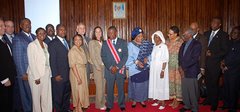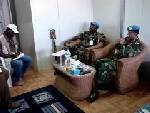

Thirty-two-year-old Guinean worker Bah Rahim witnessed some of the worst violence during the West African country's two-week strike. He told the BBC News website about his experience on Monday and about the stoppage's impact on the capital, Conakry.
The strikers want President Lansana Conte to resignThe march was huge and I saw the military kill two people right in front of me.
It started when I went outside to join the protesters at nine o'clock.
We were in my suburb of Hamdallaye and as the soldiers began shooting everyone ran to the police station but the shooting continued. It was there at the police station that I was shocked to see two people shot dead.
But this didn't stop the crowd. We moved forward towards the 8 Novembre Bridge - the way into the centre of Conakry. It's a long way, about 10km.
At the crossing there were so many soldiers and they started shooting their guns again, and killed more than seven people.
It was not my first terrifying experience with the military. Last Thursday I saw two young boys - aged about seven or eight - throw a stone at a military vehicle as it passed by.
The soldiers responded with machine-gun fire. The children ran inside and were not hurt, but you can see five bullet holes in the wall near my compound.
'Fed up'
In total it's reported that more than 30 people have died in Monday's protests - but this number will grow.
I work for a French bank - it has agreed to pay its 300 employees during the strike. There is a real consensus
Many of the wounded at the hospitals will die because we have no water here and no electricity and the medical staff have few supplies to do their work.
This country is really down.
I'm fed up. We're all fed up because Guinea is really rich but the president (Lansana Conte) is not able to run the country. He knows it and he's ill and very old.
Imagine how many billions of dollars we're losing every day because of the strike - but he never thinks about it.
All businesses are shut. There are hardly any cars on the streets - so children are playing football on the streets in my area.
Only informal markets open for about two hours early in the morning with women selling vegetables and peaches, but after that you can't even buy water to drink.
I work as a financial analyst for a French bank - it has agreed to pay its 300 employees during the strike even though none of us are working.
There is a real consensus. All the companies will pay their staff.
'Tomorrow will be hot'
I went into the centre of the city today where there was a heavy military presence and roadblocks. Nothing was open, although I managed to get access to an internet cafe not officially doing business.
Strongman feels the heat
In pictures: Guinea clashes
A young boy who sold me a mobile phone scratch card told me that if I asked the cafe's security guard he would let me in through a back door.
When I went inside, I saw about a dozen people in the room which caters for about 300. They were mainly foreigners - French, Lebanese and Americans.
I checked the web for news - but most people tend to phone each other with the latest and plans.
Today the atmosphere has been calm: people have been resting as the demonstration was tiring and civilians walked long distances.
But there is talk of a big march on Wednesday and people are angry.
They have heard that the unionists who were briefly detained on Monday were beaten up. Tomorrow will again be really hot.
Many families are suffering because of the strike, but I think people are ready to continue the fight.
I have studied in Europe and have the option to leave Guinea if I want. But I would not be happy there. I want to stay here to fight. Tomorrow I will march.
Culled From BBC Focus on Africa
The strikers want President Lansana Conte to resignThe march was huge and I saw the military kill two people right in front of me.
It started when I went outside to join the protesters at nine o'clock.
We were in my suburb of Hamdallaye and as the soldiers began shooting everyone ran to the police station but the shooting continued. It was there at the police station that I was shocked to see two people shot dead.
But this didn't stop the crowd. We moved forward towards the 8 Novembre Bridge - the way into the centre of Conakry. It's a long way, about 10km.
At the crossing there were so many soldiers and they started shooting their guns again, and killed more than seven people.
It was not my first terrifying experience with the military. Last Thursday I saw two young boys - aged about seven or eight - throw a stone at a military vehicle as it passed by.
The soldiers responded with machine-gun fire. The children ran inside and were not hurt, but you can see five bullet holes in the wall near my compound.
'Fed up'
In total it's reported that more than 30 people have died in Monday's protests - but this number will grow.
I work for a French bank - it has agreed to pay its 300 employees during the strike. There is a real consensus
Many of the wounded at the hospitals will die because we have no water here and no electricity and the medical staff have few supplies to do their work.
This country is really down.
I'm fed up. We're all fed up because Guinea is really rich but the president (Lansana Conte) is not able to run the country. He knows it and he's ill and very old.
Imagine how many billions of dollars we're losing every day because of the strike - but he never thinks about it.
All businesses are shut. There are hardly any cars on the streets - so children are playing football on the streets in my area.
Only informal markets open for about two hours early in the morning with women selling vegetables and peaches, but after that you can't even buy water to drink.
I work as a financial analyst for a French bank - it has agreed to pay its 300 employees during the strike even though none of us are working.
There is a real consensus. All the companies will pay their staff.
'Tomorrow will be hot'
I went into the centre of the city today where there was a heavy military presence and roadblocks. Nothing was open, although I managed to get access to an internet cafe not officially doing business.
Strongman feels the heat
In pictures: Guinea clashes
A young boy who sold me a mobile phone scratch card told me that if I asked the cafe's security guard he would let me in through a back door.
When I went inside, I saw about a dozen people in the room which caters for about 300. They were mainly foreigners - French, Lebanese and Americans.
I checked the web for news - but most people tend to phone each other with the latest and plans.
Today the atmosphere has been calm: people have been resting as the demonstration was tiring and civilians walked long distances.
But there is talk of a big march on Wednesday and people are angry.
They have heard that the unionists who were briefly detained on Monday were beaten up. Tomorrow will again be really hot.
Many families are suffering because of the strike, but I think people are ready to continue the fight.
I have studied in Europe and have the option to leave Guinea if I want. But I would not be happy there. I want to stay here to fight. Tomorrow I will march.
Culled From BBC Focus on Africa



No comments:
Post a Comment